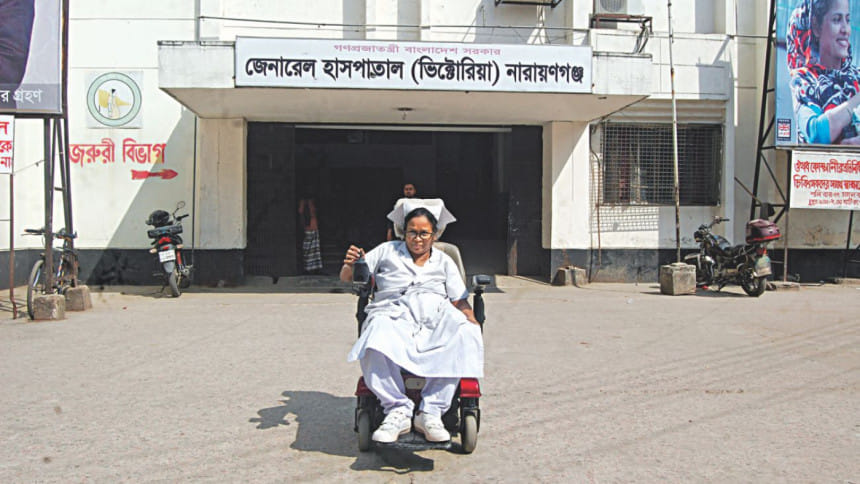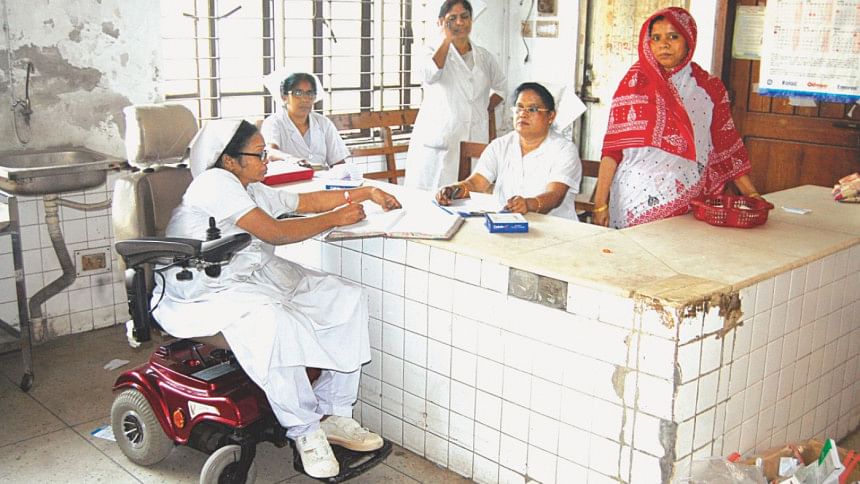Change Makers: Nightingale of Narayanganj

When Irani Baroi, a nurse from Betkadia village in Kotalipara upazila of Gopalganj first contracted fever back in December 1996 it hardly seemed unusual. But despite efforts, different doctors including at Dhaka Medical College and Hospital and in India's Chennai were unable to ascertain the cause. Worse still, the mysterious illness which to this day has not been diagnosed left her paralysed, originally in both arms and legs, although with treatment she was able to regain the use of her arms. Wheelchair-bound, she thought her nursing days may be at an end.
Irani was already an experienced nurse. She had passed a diploma in nursing from Dhaka Medical College a decade before her illness and had worked continuously at hospitals and clinics in Madaripur and Narayanganj since her graduation.
But to rebuild one's life after paralysis is no small feat. Irani took a year to complete another diploma course at the Centre for the Rehabilitation of the Paralysed in Savar, after which she was determined to return to work.
That difficult time is now a distant memory. In the intervening years Irani's career has flourished. She currently works as a senior staff nurse on the diarrhoea ward at the one-hundred-bed Narayanganj General Hospital.

“I don't face any problem working at the hospital,” she says. “I talk to patients at their bedsides like before, and they listen to me. I have very supportive colleagues who can assist if there is any small thing I can't do for being in a wheelchair.”
Her colleagues are impressed. “Irani is an efficient nurse,” says another senior staff nurse of the same ward, Mahmuda Khanam. “Though she can't walk she provides all types of service to the patients just as any nurse would. Many seriously ill patients recovered and returned home in part because of her nursing.”
Abul Hasan, the husband of patient Sumaiya Jahan also has high regard for Irani. “She is an excellent nurse. Whenever she's needed she's there, at the patient's bedside.”
Narayanganj district civil surgeon Ahsanul Haque is impressed by Irani's mental strength. “Our patients are always satisfied with her behaviour and care,” he says. “She's a very efficient worker.”
At home meanwhile Irani has adjusted to her altered physical reality just as well. “It's straightforward,” says Irani about managing the household. “My husband and two daughters help with chores. They help me to get in and out of bed from the wheelchair, and as my hands are functional, much of the housework I can thankfully do myself.”
Irani's elder daughter Easter Sikder, no doubt inspired in part by her mother, has also chosen a career in nursing. She is a staff nurse at Suhrawardy Medical College Hospital in the capital. The younger daughter Mitu Sikder, is currently completing a Bachelor of Business Administration.
Irani's husband Saimon Sikder who once worked on an NGO project, nowadays earns little. It is Irani who is the family's primary breadwinner, providing for both living costs and covering the expenses of their daughters' educations.

 For all latest news, follow The Daily Star's Google News channel.
For all latest news, follow The Daily Star's Google News channel. 



Comments